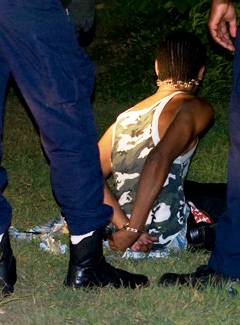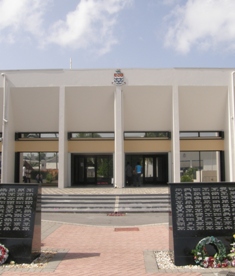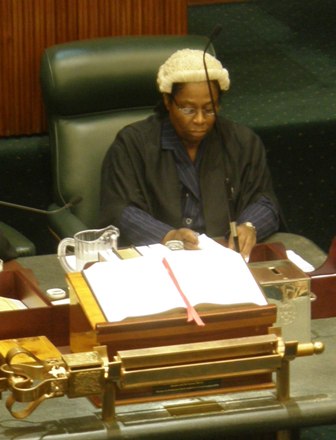Archive for September 15th, 2010

Cops clear up 8 robberies
 (CNS): Of the more than forty armed robberies that have taken place in Grand Cayman this year so far, the police have revealed that they have charged people in only eight of the incidents. Since January, gas stations, liquor stores, fast food joints, grocery stores and homes have all fallen victim to armed villains. Cash, wallets, phones, even pizzas and sodas have been stolen at knife and gun point by a mixture of robbers. Men and women, girls and boys, Caymanians and foreign nationals have used, or threatened to use, violence in the execution of the crimes which have shocked the community. So far, seven men, two teenage boys and three teenage girls have been charged with robbery and are are now going though the court system (Photo Dennie Warren jr)
(CNS): Of the more than forty armed robberies that have taken place in Grand Cayman this year so far, the police have revealed that they have charged people in only eight of the incidents. Since January, gas stations, liquor stores, fast food joints, grocery stores and homes have all fallen victim to armed villains. Cash, wallets, phones, even pizzas and sodas have been stolen at knife and gun point by a mixture of robbers. Men and women, girls and boys, Caymanians and foreign nationals have used, or threatened to use, violence in the execution of the crimes which have shocked the community. So far, seven men, two teenage boys and three teenage girls have been charged with robbery and are are now going though the court system (Photo Dennie Warren jr)

Wellness Centre offers autism awareness training
 (CNS): All pre-school teachers and public health nurses are invited to learn more about autism spectrum disorders at a training session this month provided free through a partnership between the Ministry of Education, Training and Employment and The Wellness Centre. The developmental disabilities and autism awareness training start 23 September, in the George Town Library Conference Room from 9:00am to 12 noon. Thereafter they are scheduled for the first and third Thursday of each month, between October 2010 and March 2011. Training will focus on improving overall autism awareness and will give participants the necessary knowledge to recognise early warning signs.
(CNS): All pre-school teachers and public health nurses are invited to learn more about autism spectrum disorders at a training session this month provided free through a partnership between the Ministry of Education, Training and Employment and The Wellness Centre. The developmental disabilities and autism awareness training start 23 September, in the George Town Library Conference Room from 9:00am to 12 noon. Thereafter they are scheduled for the first and third Thursday of each month, between October 2010 and March 2011. Training will focus on improving overall autism awareness and will give participants the necessary knowledge to recognise early warning signs.
The referral process for children exhibiting autism-like symptoms will also be outlined.
Noting that his ministry’s focus on professionals who work with young children is a strategic one, Education Minister Rolston Anglinsaid,” These individuals are the first point of contact for most children and the ministry believes that they can play important roles in shaping the community’s response to autism. The programme was developed because it came to my ministry’s attention that we were unable to properly identify kids with autism spectrum disorders. As such we do not know the numbers with which we are dealing and cannot offer appropriate services such as speech and language, occupational, or behaviour modification services.”
Autism, the abbreviated name for Autism Spectrum Disorders (ASD), is a group of developmental brain disorders that can cause significant social, behavioural and communication challenges. It affects each person differently, and can range from very mild to severe. However, persons with ASDs do share common symptoms such as problems with social interaction, repeat behaviours such as twirling fingers, flapping arms or wringing hands, and they may experience intense areas of interest.
According to the US-based Centre for Disease Control, the prevalence of autism is estimated at one in 150. Research has found that early identification and intervention are key factors in helping to ensure the best possible outcome for children with ASD.
Pre-school teachers and public health nurses are encouraged to call the Wellness Centre on 949-9355 or email info@wellnesscentre.ky for registration information.

Blue Iguana & Ghost Orchid featured in London event
 (CNS): Cayman’s rare flora and fauna will be featured at a Cayman Islands event at the London offices of one of the the UK’s leading broadsheet newspapers on 28 September. Blue Iguana Recovery Programme Director Fred Burton, who was awarded an MBE for preventing the extinction of Cayman’s famous endemic reptile, will be talking to 100 Telegraph readers about the history of the Blue Iguana and his desperate fight for their survival. Also at the event, John Lawrus, manager of the Queen Elizabeth II Botanic Park, will be talking about the floral treasures that can be found within the 65-acre park, including the world’s rarest orchid, the Ghost Orchid, and the new Orchid Garden, as well as native plants and trees and abundant bird life.
(CNS): Cayman’s rare flora and fauna will be featured at a Cayman Islands event at the London offices of one of the the UK’s leading broadsheet newspapers on 28 September. Blue Iguana Recovery Programme Director Fred Burton, who was awarded an MBE for preventing the extinction of Cayman’s famous endemic reptile, will be talking to 100 Telegraph readers about the history of the Blue Iguana and his desperate fight for their survival. Also at the event, John Lawrus, manager of the Queen Elizabeth II Botanic Park, will be talking about the floral treasures that can be found within the 65-acre park, including the world’s rarest orchid, the Ghost Orchid, and the new Orchid Garden, as well as native plants and trees and abundant bird life.
The Telegraph, which has an average daily circulation of nearly 850,000, says the Cayman Islands have "an astonishing diversity of species across the three islands including two of the rarest species on earth – the spectacular giant Blue Iguana and the delicate and mysterious Ghost Orchid."
The paper will be allocating the free tickets for the Cayman Islands event on a first-come, first-served basis to 100 readers. Guests will receive free Cayman Islands bumper packs, Caribbean drinks and food.
Go to the Telegraph for more details.
The story of the struggle to bring the Blue Iguanas back from the edge of extinction is told in Burton’s book, published earlier this year, The Little Blue Book.
Workers returning soon to school site
(CNS): Following the announcement by the education minister that the construction management contract on the two public high schools has been awarded to a local consortium of companies, workers are expected to return to the site in significant numbers in a matter of weeks. One local subcontractor said the most important next step in the process was for the new construction manager (CM) to figure out a schedule which will dictate the manning levels at thesite and get people back to work. Speaking in the Legislative Assembly this morning, Rolston Anglin said he expected work at the site to be fully mobilized within 30 days.
Allen Roffey of Caribbean Mechanical congratulated government on finalizing the tender and said he was looking forward to seeing the project back on rack. He said his firm had continued to do a considerable amount of work on the sites during the period since work officially stopped almost one year ago.
The announcement that the Central Tenders Committee had accepted the recommendation of the ministry on the bid from the local company made up of McAlpine, DECCO Ltd and Arch & Godfrey was made in the Legislative Assembly this morning.
The contract was a re-tender and it is worth just under $2.3 million, which the minister said represented the best value for money for government. This contract is awarded following revised plans for the schools project, which will see them finished over a phased period.
The consortium had put in a bid for the original tender but had been one of the most expensive bids. However, at that time the consortium included Hadsphaltic which has since gone into receivership.
With the contract now sorted Anglin said this not only had positive implications for the construction of the two government high schools, it was also good news for the local construction industry. “This award will stimulate the local construction industry, as contracts will be let for various works. It is the intention to sub-contract as many small construction packages as possible, with the aim of maximizing opportunity for the local contractors,” he stated.
He said his ministry, unlike his predecessor, had obligated the contractor to use local subcontractors who employed Caymanians and that the government would be monitoring staff lists of those working on the project to make sure that unemployed Cayman construction workers would be employed.
The Clifton Hunter site in Frank Sound will be the first of the two schools to be completed and the construction manager will assume responsibility for supervising the trade contractors and the day-to-day construction activities at both sites, which will, at that point, be increased to levels necessary to complete the projects. He explained that work at John Gray will focus on particular buildings which educators have prioritized.
Aside from the work undertaken by Caribbean Mechanical and other smaller jobs that have been undertaken to maintain the sites the school projects have been stopped for ten months.
The original general contractor Tom Jones International walked off the job in November 2009. The government is now engaged in what is likely to be an expensive and lengthy legal fight with the contractor. In the first round of the court room battle last month government wholly failed in its attempts to have TJI’s legal claim against it thrown out and was forced to pay costs.

Cayman still leading hedge fund domocile, survey says
 (hedgeweek): The Cayman Islands are still the predominant domicile for hedge funds, according to a survey of European hedge fund managers by Citigroup. There is no widespread move to re-domicile funds onshore ahead of final clarity on the Alternative Investment Fund Managers Directive. Onshore Ucits launches are prevalent among the larger managers, but still account for a small portion of overall hedge industry assets. There is ongoing demand for managed accounts, particularly from large institutional investors. Operational complexity is increasing as hedge fund managers offer a variety of products spanning traditional offshore domiciles, managed accounts and onshore domiciles.
(hedgeweek): The Cayman Islands are still the predominant domicile for hedge funds, according to a survey of European hedge fund managers by Citigroup. There is no widespread move to re-domicile funds onshore ahead of final clarity on the Alternative Investment Fund Managers Directive. Onshore Ucits launches are prevalent among the larger managers, but still account for a small portion of overall hedge industry assets. There is ongoing demand for managed accounts, particularly from large institutional investors. Operational complexity is increasing as hedge fund managers offer a variety of products spanning traditional offshore domiciles, managed accounts and onshore domiciles.

Civil liberties under attack
 (CNS): The combination of the forthcoming enactment of the police bill, further changes to the Court of Appeal bill and other recent legislative changes have been criticised in the wider community as undermining civil liberties. George Town MLA MLA Alden McLaughlin told the Legislative Assembly that there was an “emerging trend” in changes to legislation that appeared to be designed to strengthen the hand of the prosecution and give the crown a better chance at conviction. McLaughlin pointed out that this ran counter to the principle that the state is already more powerful than the accused, and was now making it even more difficult for people to defend themselves.
(CNS): The combination of the forthcoming enactment of the police bill, further changes to the Court of Appeal bill and other recent legislative changes have been criticised in the wider community as undermining civil liberties. George Town MLA MLA Alden McLaughlin told the Legislative Assembly that there was an “emerging trend” in changes to legislation that appeared to be designed to strengthen the hand of the prosecution and give the crown a better chance at conviction. McLaughlin pointed out that this ran counter to the principle that the state is already more powerful than the accused, and was now making it even more difficult for people to defend themselves.
Minister asks for more culture for less money
(CNS): With budget constraints impacting all government departments, the minister with responsibility for culture has asked the Cayman National Cultural Foundation (CNCF) to try to do more for less by co-ordinating their promotional and education efforts with other related bodies such as the National Museum, the National Archive, the National Gallery and the National Trust. On a recent visit to the foundation Mark Scotland urged Cayman’s cultural organisations to also identify an overall cultural philosophy to promote local culture. “Coordinating efforts will enable us to do more with less – something that is more important than ever as budgets and private donations continue to shrink,” Scotland said.
Artistic Director for CNCF Henry Muttoo said he appreciated the government’s concern for cultural development and sustainability through education and training, and told him that coordinated efforts were already part of the work of the foundation.
“The Foundation also supports a coordinated effort and, as such, we are already working closely with our sister organisations and the ministry to realise the common goals of developing, preserving and celebrating arts and culture in these islands,” he said, adding that Cayfest and the National Arts & Culture Awards were just two such examples.
The CNCF is a non-profit organization that was created to “stimulate, facilitate and preserve cultural and artistic expression generally, particularly the preservation and exploration of Caymanian performing, visual and literary arts.”
It is funded by an annual government grant from the Ministry of Health, Environment, Youth, Sports and Culture. Additional funding comes from corporate sponsorship, event ticket sales and rental of the Harquail Theatre and Studio Theatre.
The work of the Cultural Foundation incorporates arts and cultural preservation, cultural festivals, the National Theatre, artistic development, youth arts, and special projects.
“Volunteers are always needed to assist with various programmes and projects and we invite people to join in preserving our unique traditions,” Mr. Muttoo said.

Former teacher reveals court ordeal
 (CNS): Last month the Cayman Islands Court of Appeal upheld the Grand Court’s decision to overturn the conviction of Marius Voiculescu for possession of drugs, ending the former teacher’s long ordeal. After the controversial courtroom saga over a half burned spliff Voiculescu agreed to a candid interview with CNS about his experience with the judicial system and how he and his family have suffered as a result of thecrown’s apparently relentless pursuit of a conviction over 0.004 of ganja. Voiculescu faced five court cases and significant expense, which all started when he found a cigarette packet in the car park of the condo complex where he lived.
(CNS): Last month the Cayman Islands Court of Appeal upheld the Grand Court’s decision to overturn the conviction of Marius Voiculescu for possession of drugs, ending the former teacher’s long ordeal. After the controversial courtroom saga over a half burned spliff Voiculescu agreed to a candid interview with CNS about his experience with the judicial system and how he and his family have suffered as a result of thecrown’s apparently relentless pursuit of a conviction over 0.004 of ganja. Voiculescu faced five court cases and significant expense, which all started when he found a cigarette packet in the car park of the condo complex where he lived.

Jury must acquit, says lawyer
 (CNS): The crown’s evidence is insufficient to warrant a conviction in the case against Brandon Leslie-Ebanks and his co-defendants, Osbourne Douglas and Patrick McField, for the murder of Omar Samuels, the jury was told on Tuesday by Nicholas Rhodes QC, who said, as he made his closing statement, that they must acquit. The trial of the three men for that crime is now complete and the judge in the case, Justice Charles Quin, began his summing up on Wednesday morning. In the final closing statement on Tuesday, Rhodes said the crown’s key witnesses had lied and forreasons that may never be known had chosen to frame his client and his co-defendants.
(CNS): The crown’s evidence is insufficient to warrant a conviction in the case against Brandon Leslie-Ebanks and his co-defendants, Osbourne Douglas and Patrick McField, for the murder of Omar Samuels, the jury was told on Tuesday by Nicholas Rhodes QC, who said, as he made his closing statement, that they must acquit. The trial of the three men for that crime is now complete and the judge in the case, Justice Charles Quin, began his summing up on Wednesday morning. In the final closing statement on Tuesday, Rhodes said the crown’s key witnesses had lied and forreasons that may never be known had chosen to frame his client and his co-defendants.

Ethics body hits early hurdles
 (CNS): Although only a few months old, the Commission for Standards in Public Life (CSPL) has already encountered a number of hurdles preventing it from doing what it is supposed to do when it comes to supervising public ethics. Its primary role is to monitor the potential for corruption and conflict of interest among politicians and public servants, but according to its first report it needs a law to ensure compliance. The commission revealed that in an attempt to examine the register which requires politicians to declare their business interests it found no reports had been made by the Legislative Assembly clerk and a select committee created to deal with issues relating to the Register of Interests has never met.
(CNS): Although only a few months old, the Commission for Standards in Public Life (CSPL) has already encountered a number of hurdles preventing it from doing what it is supposed to do when it comes to supervising public ethics. Its primary role is to monitor the potential for corruption and conflict of interest among politicians and public servants, but according to its first report it needs a law to ensure compliance. The commission revealed that in an attempt to examine the register which requires politicians to declare their business interests it found no reports had been made by the Legislative Assembly clerk and a select committee created to deal with issues relating to the Register of Interests has never met.